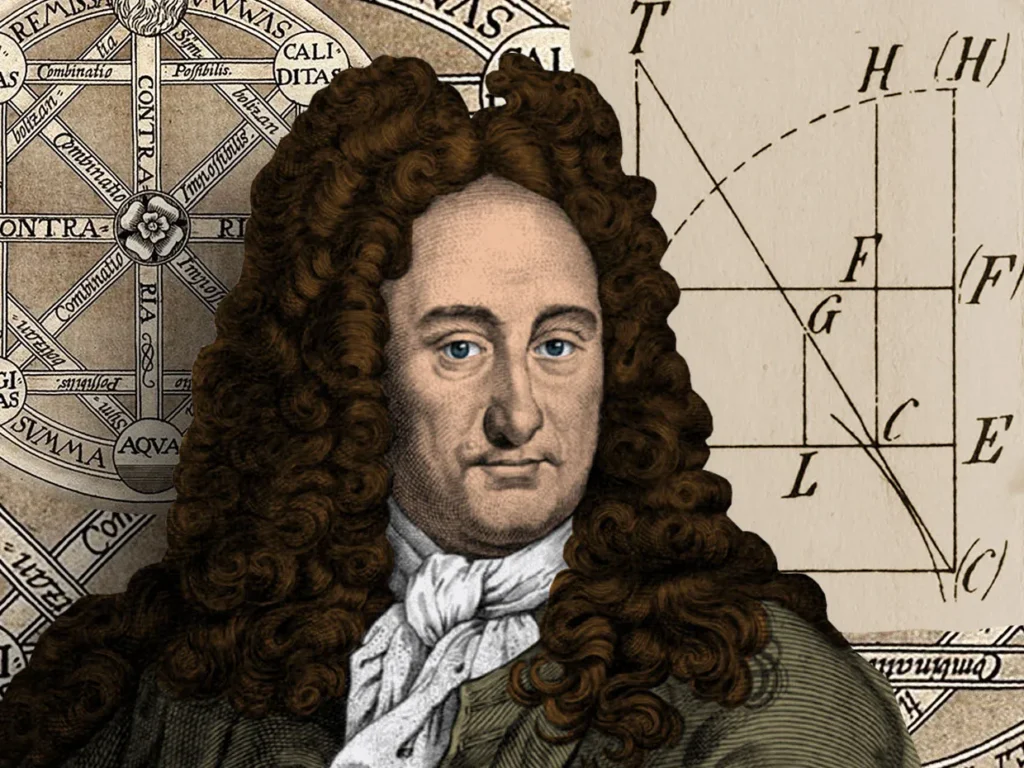He was famous for developing the differential and integral calculus on his own. He was born in Leipzig, Germany, on June 21 (July 1, New Style), 1646, and passed away in Hanover, Germany, on November 14, 1716.

Young Age
Leibniz was born into a devoted Lutheran family at a time when the Thirty Years’ War, which had left Germany in ruins, was coming to an end. He attended the Nicolai School for his early education, but he mainly studied on his own in the father’s library after the latter passed away in 1652. Around Easter of 1661, he enrolled at the University of Leipzig to study law, where he was exposed to the theories of thinkers like Galileo, Francis Bacon, Thomas Hobbes, and René Descartes who had revolutionized their respective fields.
Throughout his career, Leibniz frequently used the verb “to reconcile,” imagining bringing together these modern philosophers and the Aristotle of the Scholastics. His baccalaureate thesis, De Principio Individui (“On the Principle of the Individual”), which was published in May 1663, was partially influenced by Lutheran nominalism (the theory that universals have no reality but are merely names) and emphasized the existential significance of the individual, who is to be explained by his whole being (entitate tota), rather than by either matter alone or by form alone. This notion served as the initial germ of the upcoming “monad.”. An ordered combination of components, such as words, sounds, numbers, or colors, can be used to represent all reasoning and discovery, whether it be verbal or nonverbal. This theory, which served as the theoretical basis for some modern computers, was developed by him in his 1666 essay De Arte Combinatoria (“On the Art of Combination”).
Governing Period
Despite not having a job that paid him money, Leibniz continued his work. However, he had decided to work for John Frederick, Duke of Braunschweig-Lüneburg, by October 1676. John Frederick, a 1651 Lutheran who later became a Catholic, was appointed duke of Hanover in 1665. Initially appointed as a librarian, Leibniz began to request the position of councillor in February 1677, and in 1678, he was given it.
To be useful in all ways, Leibniz worked on hydraulic presses, windmills, lamps, submarines, clocks, and a variety of other mechanical devices. Additionally, he carried out phosphorus experiments and created a technique for perfecting carriages. He also suggested creating academies and making education more relevant. He also developed a wind-powered water pump that enhanced mining in the Harz Mountains, and from 1680 to 1685, he frequently worked as an engineer in these mines. Leibniz is regarded as one of the founding fathers of geology because of the discoveries he made there, including the idea that the Earth was once molten. He held numerous jobs but persisted in his pursuit of mathematics, perfecting the binary system of numeration in March 1679 (i. e. e. , using two as a base), and by the year’s end he proposed the theoretical framework for analysis situs, which is now referred to as general topology. Specific traits of groups of related physical or abstract elements are the focus of this area of mathematics. In addition, he was refining his dynamics and philosophy, which were moving away from Cartesian thinking. Duke John Frederick died at this point, and Ernest Augustus I took his place on January 7, 1680.
France’s severe persecution of Protestants from 1680 to 1682 led to the revocation of the Edict of Nantes on October 18, 1685. Due to Louis XIV’s early claims to ten cities in Alsace and his capture of Strasbourg in 1681, France was also growing as a threat on its borders despite the ongoing peace. Thus, France started to pose a significant threat to the empire, which had already been shaken on the east by a Hungarian uprising and by the advance of the Turks, who had only been stopped by the victory of John III Sobieski, king of Poland, at the siege of Vienna in 1683. Leibniz supported his prince and the empire as a loyal citizen. He advocated categorizing the records, put forth a desalination technique, and penned a ferocious pamphlet critical of Louis XIV in both French and Latin. Additionally, he offered his prince ideas on how to boost linen production.
After Ernest Augustus’s passing on January 23, 1698, George Louis succeeded him. The prince was a drunken, obnoxious partygoer who kept Leibniz in the background. Leibniz was always on the move, and the only thing that gave him comfort was his friendship with Sophia Charlotte and her mother, Princess Sophia. To escape Hanover, he made up any justification. He started working on the church’s reconciliation once more. In Berlin, he had to persuade the Calvinists and Lutherans to come together; in Paris, he had to overcome Bishop Bénigne Bossuet’s opposition; in Vienna (where Leibniz later made a return in 1700), he had to enlist the emperor’s support, which had great weight; and in England, he had to convince the Anglicans.
When William, duke of Gloucester, passed away in England in 1700, James I’s great-grandson George Louis became a candidate to succeed his grandfather as king. Leibniz, a jurist and historian, was tasked with formulating his claims regarding the rights of the house of Braunschweig-Lüneburg with regard to this succession.
Related Posts
Donald Trump – Best Guide in 2023
